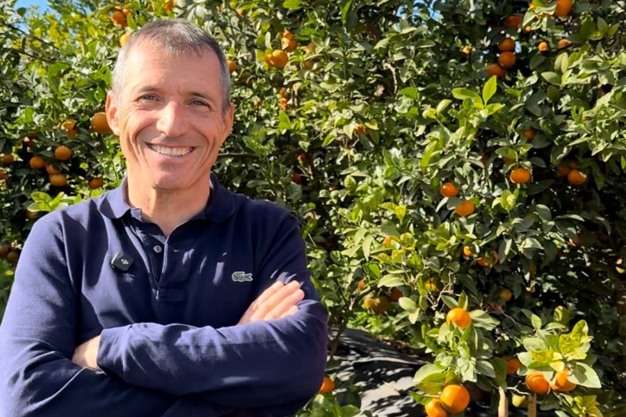According to Alberto Torres, Manager of the Valencian company Citruslandia, which specializes in the production of organic clementines and mandarins, although the consumption of organic citrus fruit has remained relatively stable over the last two years, producers are facing challenges such as the severe increase in the price of the product due to the growing number of certificates required by European chains, which could be a source of confusion among consumers and have an impact on sales.
 Alberto Torres in his Nadorcott bío farm in Sagunto (Valencia).
Alberto Torres in his Nadorcott bío farm in Sagunto (Valencia).
"Following a period in which the demand for organic citrus dropped after the pandemic, in the last two seasons we've had stable sales, even if certain chains recorded some declines," says Alberto Torres. "Nonetheless, sales could stagnate if costs continue to rise, mainly due to the proliferation of certificates and organic seals demanded by distribution chains in various countries. This situation is already bordering on the ridiculous; it's almost like a parody," says Torres.
"We are mostly talking about all the extra certifications, beyond the European organic seal, Global GAP, GRASP, or eSpring. We've ended up in some kind of 'certification war' that is 'asphyxiating' producers due to the required investment in infrastructures, audits, and, in short, expenses that end up making the product more expensive," says Torres. "I also believe that end consumers may be confused by seeing so many different labels and that consumption could be affected.
In fact, according to Torres, the supply of organic citrus is increasingly falling into fewer hands. "We have seen many small operators devoted to the production and marketing of organic oranges and mandarins disappearing because it is becoming more and more difficult and you have to do things really well to make a profit."
"The existence of so many extra certificates and administrative barriers is causing many operators to give up because they don't have sufficient capacity to cope with it all. It's very clear that, nowadays, whoever doesn't have significant volumes, with at least 40-60% being their own production, is unable to compete," says Torres. "We are also seeing a remarkable increase in the supply of organic mandarins in Italy and in more specific areas, such as Corsica in France."
Since 1997, Citruslandia has been specialized in the production and marketing of organic clementines and mandarins. It works with the Oronules, Esbal, Clemenules, Tango, Nadorcott, and Orri varieties. It is also growing as a producer of organic oranges.
For more information:
Alberto Torres
Citruslandia S.L.
Sorní 17, 1
46004 Valencia, Spain
Tel.: +34 609588939
[email protected]
citruslandia-sl










